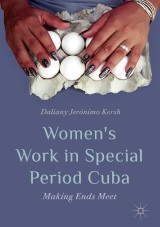Details

Women's Work in Special Period Cuba
Making Ends Meet|
80,24 € |
|
| Verlag: | Palgrave Macmillan |
| Format: | |
| Veröffentl.: | 14.02.2019 |
| ISBN/EAN: | 9783030056308 |
| Sprache: | englisch |
Dieses eBook enthält ein Wasserzeichen.
Beschreibungen
The abrupt loss of Soviet financial support in 1989 resulted in the near-collapse of the Cuban economy, ushering in the almost two decades of austerity measures and severe shortages of food and basic consumer goods referred to as the Special Period. Through the innovative framework of individual and collective memory, Daliany Jerónimo Kersh brings together analysis of press sources and oral histories to offer a compelling portrait of how Cuban women cleverly combined various forms of paid work to make ends meet. Disproportionately impacted by the economic crisis given their role as primary caregivers and household managers and unable to survive on devalued state salaries alone, women often employed informal and illegal earning strategies. As she argues, this regression into gendered work such as cooking, sewing, cleaning, reselling, and providing sexual services precipitated by the post-Soviet crisis to a large extent marked a return to pre-revolutionary gendered divisions of labor.
1. Contextualizing Women's Work in Special Period Cuba.- 2. Women and Work in Cuba During the First Three Decades of the Revolution, 1959–1989.- 3. ‘<i>El Salario no Alcanzaba</i>’: The Salary Did Not Stretch.- 4. 'The Invisible Day'.- 5. Formal Work: State Occupations and Work in the Tourist Industry.- 6. Informal Work: <i>Cuentapropismo</i>, La Lucha</i>, and <i>Jineterismo</i>.- 7. The Combination of Different Types of Work.- 8. Attitudes Towards Work.- 9. Conclusion: ‘<i>Yo creo que nosotros estamos en el PE todavía</i>’—I Still Think We’re in the Special Period.
<b>Daliany Jerónimo Kersh</b> is Assistant Professor of International History at Richmond, The American International University in London.
The abrupt loss of Soviet financial support in 1989 resulted in the near-collapse of the Cuban economy, ushering in the almost two decades of austerity measures and severe shortages of food and basic consumer goods referred to as the Special Period. Through the innovative framework of individual and collective memory, Daliany Jerónimo Kersh brings together analysis of press sources and oral histories to offer a compelling portrait of how Cuban women cleverly combined various forms of paid work to make ends meet. Disproportionately impacted by the economic crisis given their role as primary caregivers and household managers and unable to survive on devalued state salaries alone, women often employed informal and illegal earning strategies. As she argues, this regression into gendered work such as cooking, sewing, cleaning, reselling, and providing sexual services precipitated by the post-Soviet crisis to a large extent marked a return to pre-revolutionary gendered divisions of labor.
Examines women’s labor in post-Soviet Cuba, focusing on five main sources of income that women used to survive, including the black market, entrepreneurship, sex work, tourism sector work, and state employment, as well as combinations of work in different sectors Uses the theoretical framework of individual and collective memory to illuminate labor conditions for Cuban women since 1989 Builds upon the feminisation thesis that Cuban women were disproportionately affected by the post-Soviet Special Period economic crisis
Diese Produkte könnten Sie auch interessieren:

The Last Samurai - Japanische Geschichtsdarstellung im populären Kinofilm

von: Daniel Scherrer

34,99 €















